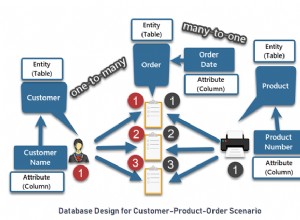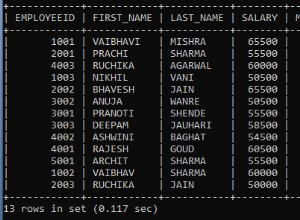Rozwiązałem ten problem za pomocą interfejsu OraclePreparedStatement i Hibernate UserType.
Utworzono nową klasę UserType, rozszerzając interfejs org.hibernate.usertype.UserType i dostarczając implementację metod nullSafeSet() i nullSafeGet() .
nullSafeSet(), pierwszy parametr mamy jako PreparedStatement, wewnątrz metody przerzuciłem PreparedStatement na obiekt OraclePreparedStatement i przekazałem wartość String za pomocą metody setFixedCHAR().
Oto pełny kod klasy impl UserType.
package nc3.jws.persistence.userType;
import java.io.Serializable;
import java.sql.PreparedStatement;
import java.sql.ResultSet;
import java.sql.SQLException;
import java.sql.Types;
import org.apache.commons.lang.StringUtils;
import org.hibernate.type.StringType;
import org.hibernate.usertype.UserType;
/**
*
* based on www.hibernate.org/388.html
*/
public class OracleFixedLengthCharType implements UserType {
public OracleFixedLengthCharType() {
System.out.println("OracleFixedLengthCharType constructor");
}
public int[] sqlTypes() {
return new int[] { Types.CHAR };
}
public Class<String> returnedClass() {
return String.class;
}
public boolean equals(Object x, Object y) {
return (x == y) || (x != null && y != null && (x.equals(y)));
}
@SuppressWarnings("deprecation")
public Object nullSafeGet(ResultSet inResultSet, String[] names, Object o) throws SQLException {
//String val = (String) Hibernate.STRING.nullSafeGet(inResultSet, names[0]);
String val = StringType.INSTANCE.nullSafeGet(inResultSet, names[0]);
//System.out.println("From nullSafeGet method valu is "+val);
return val == null ? null : StringUtils.trim(val);
}
public void nullSafeSet(PreparedStatement inPreparedStatement, Object o,
int i)
throws SQLException {
String val = (String) o;
//Get the delegatingStmt object from DBCP connection pool PreparedStatement object.
org.apache.commons.dbcp.DelegatingStatement delgatingStmt = (org.apache.commons.dbcp.DelegatingStatement)inPreparedStatement;
//Get OraclePreparedStatement object using deletatingStatement object.
oracle.jdbc.driver.OraclePreparedStatement oraclePreparedStmpt = (oracle.jdbc.driver.OraclePreparedStatement)delgatingStmt.getInnermostDelegate();
//Call setFixedCHAR method, by passing string type value .
oraclePreparedStmpt.setFixedCHAR(i, val);
}
public Object deepCopy(Object o) {
if (o == null) {
return null;
}
return new String(((String) o));
}
public boolean isMutable() {
return false;
}
public Object assemble(Serializable cached, Object owner) {
return cached;
}
public Serializable disassemble(Object value) {
return (Serializable) value;
}
public Object replace(Object original, Object target, Object owner) {
return original;
}
public int hashCode(Object obj) {
return obj.hashCode();
}
}
Skonfigurowano tę klasę z adnotacją @TypeDefs w klasie Entity.
@TypeDefs({
@TypeDef(name = "fixedLengthChar", typeClass = nc3.jws.persistence.userType.OracleFixedLengthCharType.class)
})
Dodano ten typ do kolumn typu CHAR
@Type(type="fixedLengthChar")
@Column(name="SERVICE_NAME",nullable=true,length=16)
public String getServiceName() {
return this.serviceName;
}




